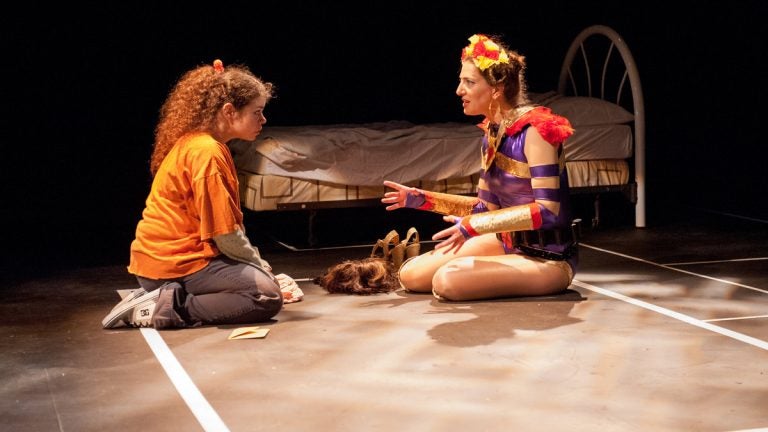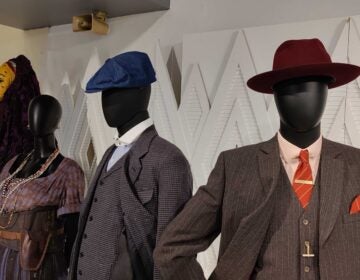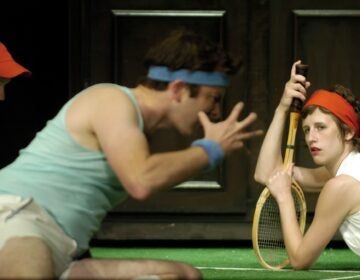Review: ‘Lulu’s Golden Shoes,’ smothered in fantasy

Rachel O'Hanlon-Rodriguez (left) and Leah Walton in Flashpoint Theatre Company's production of 'Lulu's Golden Shoes.' (Photo courtesy of John Flak)
The play “Lulu’s Golden Shoes” displays urban poverty through the lens of fantasy, and I kept getting the feeling it was trying to tell me something. But I can’t figure out what.
It’s billed as a dark comedy but is barely funny, not in the vivid production from director Brenna Geffers by Flashpoint Theatre Company. The play is by Philadelphia native Quiara Alegría Hudes, who won the playwriting Pulitzer and wrote the book for the musical ” In the Heights,” and this is its first local production. “Lulu’s Golden Shoes” is about a young woman named Ana who fails to get into college (the super Rachel O’Hanlon-Rodriguez), her mom (Anita Holland) and Lulu, the prostitute who lives next door (Jennifer Kidwell). Lulu’s trashy brand of glamour is like sugar to the nowhere-bound Ana.
Hudes has a way with fantasy and cultural tradition — particularly Latino storytelling, heavy here with the interpretation of dreams and the appearance of signs. She weaves these wonderfully into the sometimes crude “Lulu’s Golden Slippers” — the trapped Ana wants to be left alone with the fascination Lulu provides and with her own sexual evolution.
Her mom, a psychic about such major details as love and money, believes a bath packed with flower petals, and with Ana in the tub, cures all. Ana is a loner, pudgy (and girlishly attractive in the performance by O’Hanlon-Rodriguez), left-out and not least, poor. All of this is realistic, but Hudes creates three characters who make it mystical, even spiritual, at times.
Two of them are alchemists (Davey Stratten White and Chris Anthony) doing research into prostitutes. In their quest to turn ordinary materials into gold, they’ve stumbled upon the hearts of prostitutes, beginning with Lulu and apparently moving on to any other woman, with or without documentation. A third fantastical character, played with great spirit by Leah Walton, is the voice in Ana’s head. She’s part companion, part instigator, part guardian angel; in Natalia de la Torre’s distinctive costume, the character looks like a Harlequin gone to the wild side.
These dreamlike characters play larger parts in “Lulu’s Golden Shoes” as the plot progresses and shoots into the ether. Are we watching a story centered in young Ana’s mind? Are the dreamy characters metaphors for something? What does all this say about poverty, barrio life and about Ana herself?
I can’t suggest any answers because fantasy becomes a cover for reason in “Lulu’s Golden Shoes.” And an oblique, if nicely dramatic, ending makes it even harder to parse. Sometimes, fantasy provides insight. In “Lulu’s Golden Shoes,” the fantasy obscures everything.
“Lulu’s Golden Shoes,” produced by Flashpoint Theatre Company, runs through August 2 at the University of the Arts’ Caplan Studio Theatre, on the 16th floor of 211 S. Broad St. flashpointtheatre.org.
WHYY is your source for fact-based, in-depth journalism and information. As a nonprofit organization, we rely on financial support from readers like you. Please give today.




